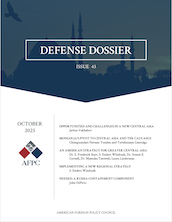
Rethinking Central Asia
Opportunities and Challenges in A New Central Asia
Mongolia’s Pivot to Central Asia and the Caucasus
An American Strategy for Greater Central Asia
Implementing A New Regional Strategy
Needed: A Russia Containment Component

Opportunities and Challenges in A New Central Asia
Mongolia’s Pivot to Central Asia and the Caucasus
An American Strategy for Greater Central Asia
Implementing A New Regional Strategy
Needed: A Russia Containment Component
As rivals flood the world with propaganda, Washington is dismantling its best tools to respond.
Europe: A problematic dependence;
Trouble (for Moscow) in the Arctic;
Enemies, enemies everywhere
These days in Europe, there is a near-unanimous consensus about the threat posed by Russia and the need to continue to support Ukraine against Moscow’s aggression. But Europe’s steadfastness could be undermined by a different factor—a sustained and growing dependence on Russian energy among a number of its members.
Madagascar’s military seizes power after mass protests;
Congo trades export ban for cobalt quotas;
Russian forces fill the void as jihadists surge in Sahel;
Cameroon’s unrest grows